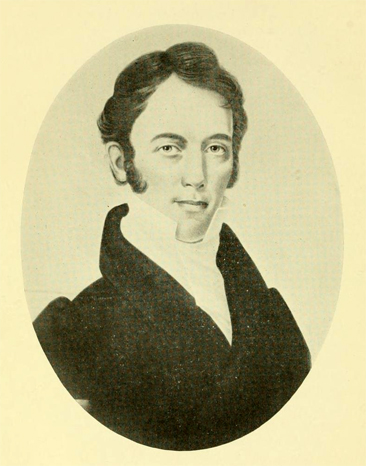12 May 1789–12 Aug. 1847

Louis Dicken Wilson, merchant, military officer, and public servant, was born on the family plantation south of Tar River in Edgecombe County, the son of William and Elizabeth Dicken Wilson. After receiving a modest education at the local academy, he went to the town of Washington in 1807 and worked in a countinghouse while learning and reading law. A few years later he returned to Tarboro and qualified as a notary public on May 28, 1812, and as a justice on February 24, 1817.
Wilson became an apprentice of Concord Lodge No. 58, AFAM, on March 16, 1813, and a Master Mason on July 20th. He served as secretary (December 21, 1813–December 29, 1814) and junior warden (December 23, 1817–November 23, 1819). Elected senior grand warden of the Grand Lodge on December 19, 1818, and junior grand warden on December 19, 1825, he became the fourteenth grand master of Masons in North Carolina on December 15, 1827. He was succeeded in the latter post by Richard Dobbs Spaight on December 19, 1830. His last recorded Masonic office was grand lecturer (December 15, 1833–December 27, 1837).
In addition to representing Edgecombe County in the General Assembly (1814–19), Wilson collected the Tarboro taxes (1819–29) and served as a state senator (1820, 1824–32). On September 20, 1827, he attended the Free Trade Convention at Philadelphia, and on December 19th he was elected brigadier general of the Fifth North Carolina Brigade, a rank that he held as late as 1846. He was one of the two delegates from Edgecombe County to the constitutional convention of June 4-July 11, 1835; later that year he was a delegate to the Democratic National Convention.
In 1829 Wilson first gave his support to the infant public school movement, and supported the education of free Black people. On January 4, 1831, he and Elder Joshua Lawrence were among the incorporators of the Hickory Grove Academy, and on September 30th he bought as his permanent home the former residence of Congressman Thomas Blount, erected in 1810. In 1838 he was elected a member of the board of trustees of The University of North Carolina, and in 1844 the state senate placed him on the committee on education and the Literary Fund.
Returning to the senate in 1838, he represented Edgecombe County until requesting a leave of absence on December 12, 1846, in order to support the patriotic honor of North Carolina by personally participating in the War with Mexico. He had served as speaker at the 1842–43 session. Wilson left Raleigh for the last time on January 1, 1847, and returned to Edgecombe County, where on January 5th he was elected captain of Company A, First Edgecombe Volunteer Regiment, the first company to offer its services to Governor William A. Graham. The volunteers met the next day at Toisnot Depot (now the city of Wilson) "to partake of a barbecue dinner and arrange plans prior to their departure."
Wilson's company arrived at Fort Johnston near Wilmington on January 8th for mustering into the U.S. Army and brief preparation before embarking from Smithville for Mexico in the schooner E. S. Powell on February 22nd. Meanwhile he and several other officers had returned to Tarboro to attend a dinner at Pender's Hotel on January 9th and the celebration on January 18th at which a silken banner provided by supporters was received with a speech by Wilson. It was not until March 6, 1847, that the Edgecombe County companies A and E arrived at Brazos, from which they proceeded the next day to San Francisco on the Río Grande.
On March 3, 1847, President James K. Polk offered Wilson the post of colonel of the Twelfth Regiment of U.S. Infantry, which Wilson accepted at Washington City on April 9th. It was expected that he and the 850 troops under his command would leave Vera Cruz and proceed towards Mexico City on August 7th as the guard with a train of supplies for General Winfield Scott's army, but Wilson contracted yellow fever six days earlier and died. The military funeral and burial were held the next day, but his casket was shipped subsequently to Edgecombe County and an oration was pronounced on May 22, 1850, on the occasion of the laying of the cornerstone of the monument erected to his memory.
Wilson was also an enslaver. The number of people Wilson enslaved varied throughout his life. At the time of the 1820 census, Lewis D Wilson of Tarborough was listed as the enslaver of one person. By 1830, this number had grown to 11 people. In 1840, the last census before Wilson's death, the number of people he had enslaved had reached 78.
Wilson never married and left no known descendants. At his death, he bequeathed $40,000 to Edgecombe County for the future benefit of the public poor. About $12,000 was used to support impoverished people, $10,000 lost by speculation and investment, and $18,000 used during the Reconstruction-period. The town of Wilson was incorporated and named in his memory on January 29, 1849, followed by Wilson County on February 13, 1855. An oil portrait of Wilson is owned by Becky White Johnston of Charlottesville, Virginia.